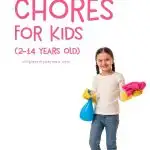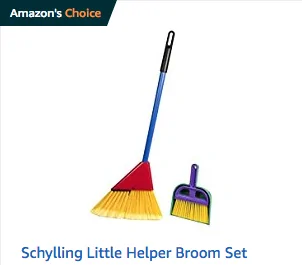Chores are more than just helping out around the house.
Children who do chores around the home learn responsibility and how to function as a part of the family unit. They can take pride in a job well done, and it boosts their self-esteem.
Kids who do chores have a sense of ownership around the home and therefore are more likely to attempt to keep it clean. These skills carry on well past childhood and into adult life.
And, studies have shown that children that do chores turn out to be more self-sufficient, confident, and independent adults.
Below are a list of age appropriate chores for kids from 2 to 14.

This post contains affiliate links for your convenience. You can read my full disclosure here.
Toddler Chore Ideas (ages 2-4)
The very youngest children are usually the most willing to help around the house. They are learning how to express themselves and gaining independence.
Work side-by-side with your child and make it fun!
Set them up for success by having toy containers clearly labeled with pictures, and model cleaning up one activity before starting a new one. Here is a short list of tasks tiny hands can tackle:
- Put away toys (a fun organizer like this one can help)
- Dust
- Put dirty clothing in a hamper
- Put away some clean clothing
- Wipe cabinets, baseboards, and appliances with a wet rag
- Help feed small pets (fish, hamsters, etc.)
- Pick up sticks and debris in the yard
- Empty scraps into the compost pile
- Sweep with a broom
✅ TIP: Using a child-sized broom like this one will get your kids excited to clean and it’s the perfect size for them.
Preschool Chore Ideas (ages 4-5)
Preschoolers are still often very eager to help and feel like a “big kid.”
At this age, a fun chore chart can inspire them to do even more around the house.
Keep directions simple and model each one several times. If your child is struggling with motivation, putting on fun music or playing “beat the timer” can help them get these chores completed:
- Vacuum floor with a small hand-vac (this one has 8,000+ 5-star reviews)
- Swiffer floors
- Set the table
- Wipe bathroom sinks
- Match socks
- Fold towels
- Water plants
- Feed larger pets (dogs/cats)
- Weed flowerbeds/gardens
- Put away outdoor toys
- Make their bed
- Get the mail
Need some fun ways to play with your preschooler? Be sure to check out these fun preschool board games that kids and parents both enjoy!
Young School-Age Kids Chores (ages 6-8)
As children start school, they learn to be more responsible for their belongings.
Be sure to reinforce putting things in the proper places, including putting away cleaning supplies when they have finished a task!
These chores can be added to the previous lists:
- Bring groceries into the house
- Put away groceries
- Empty bathroom trash
- Vacuum
- Take trash to can
- Wipe the microwave out
- Rake leaves (this set is perfect for outdoor chores)
- Shovel light snow
- Clear the table
- Wash dishes (unbreakable and not-sharp ones only!)
- Empty dishwasher
- Load dishwasher
- Switch out laundry from washer to dryer
- Bring laundry to washer and dryer
- Pack backpack and set out clothes for next day
- Put away folded laundry
Older Elementary Kids Chore List (Ages 9-11)
This is the age where a token economy might be needed to continue cooperation. Be careful, though, not to pay out for regular chores.
Save rewards for going above and beyond the expected work – otherwise, they’ll want to be paid every time they put away a pair of socks.
Having a set schedule or time limit for when chores need to be completed can save arguments about “doing it later.” They can complete all the previous chores and add:
- Take trash/recycling to the curb
- Assist with meals/prepare simple meals
- Fix their own breakfast
- Wash windows and mirrors
- Dishes
- Load/Unload dishwasher
- Vacuum floors
- Put clothes in the washer and dryer
- Fold laundry
Middle School Kids Chore Ideas (Ages 12-14)
As children enter middle school, it is important to recognize that their schedules are more hectic and their homework load increases.
Reinforcing a “work first, then play” with chores will help them also handle these other challenges in their lives.
At this age, earning a weekly allowance is appropriate. Discuss with your child about what your expectations are, how payment will be made, how they can earn extra money by doing additional chores, and other details.
And be sure to reinforce that if the work is not done, they do not get paid nor will you give them a loan. Some chores they can handle are:
- Meal preparation
- Mow lawn
- Clean up after pets/empty litter box
- Watch younger siblings
- Walk dog
- Pack lunches
- Clean tub/shower/toilet
- Shovel heavy snow/run snowblower
Some Final Chore Tips
DO Remember – Every child is different. These are guidelines, but every parent needs to consider their own child’s abilities and maturity levels.
DON’T – Expect perfection. Remember, they are learning a skill and it will take some time and practice to get it right!
DO – Take the time teach them how to do it properly. You might have to do this more than once. Taking a picture of what a completed job looks like can be helpful for younger children.
DON’T – Worry if it takes them a long time to do something you can do quickly. Efficiency is a learned skill too.
DO – Start early! Young children love to help, so encourage it!
DON’T – Allow younger children to work with harsh cleaning fluids. Stick with soapy water for young children.
DON’T – Complain about your own chores unless you want your children to complain about theirs.
DO – Praise as often as possible when they do a great job.
DON’T – Praise them for sloppy work or unfinished chores. Instead, gently remind them of what still needs to be completed.
DO – Let them know how important their help is. Say things like, “I am so happy you can help me with this chore. Now we have more time to do fun things together!”
DO – Reinforce that these chores are for the good of the whole family, and everyone is working together.
DON’T – Use chores as punishments.
DO – Set aside time each day for chores, or set a schedule.
DO – Try to make it fun. Play music, create challenges, or listen to an audiobook like this one while working!
Your Turn
Do your kids do chores? Let me know in the comments below.

Sam is the crafter and founder of Simple Everyday Mom. She has been featured in Oprah Mag, Good Housekeeping, The Spruce Crafts, Country Living, The Bump and more. Read more.


